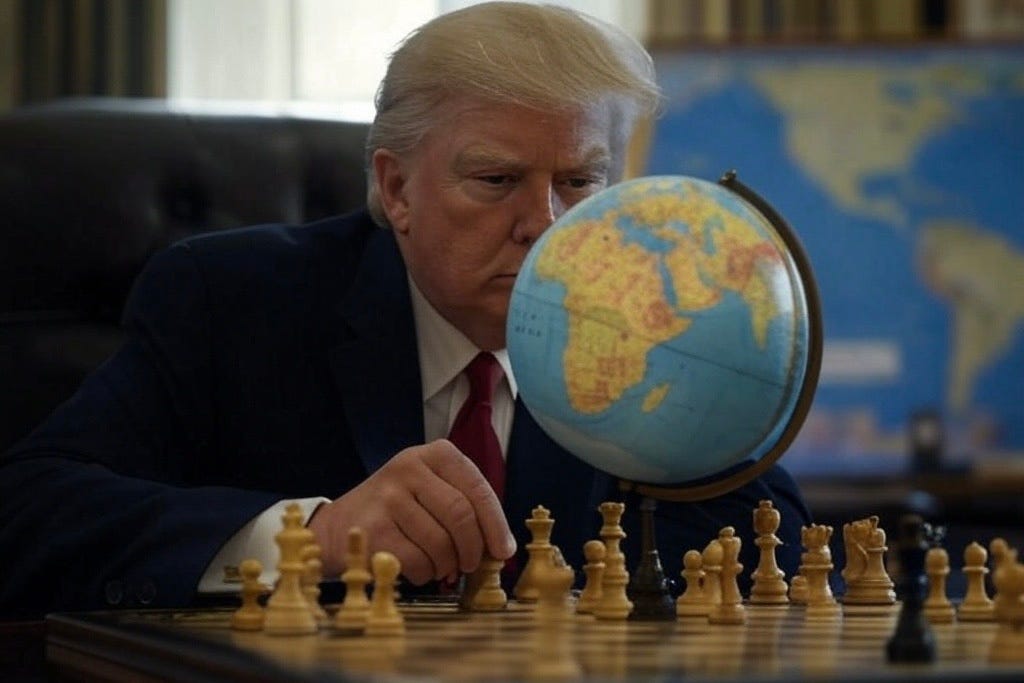Raymond Keene OBE is an English chess grandmaster, a FIDE International Arbiter, a chess organiser, and a journalist and author.
Keene won the British Chess Championship in 1971 and was the first player from England to earn a Grandmaster norm, in 1974. In 1976, at age 28, he was awarded the Grandmaster title.
He is currently the chess columnist at TheArticle and The British Chess Magazine.
Before we move onto chess, can you explain what you think Donald Trump’s goal is, and how his current tactics are intended to achieve that?
I believe that Trump has been both consistent and transparent. He is not random. He has repeatedly announced what he intends to do and then tries to do it. Accusations of unpredictability are wide of the mark. His first Presidency was hampered by an unfavourable congress and his inexperience in dealing with entrenched interests.
His goal is genuinely to make USA great again by following common sense measures which the average citizen likes. Such include:
Reinvigoration of American industry;
Clamping down on illegal immigration;
Same for drugs;
Eliminating government waste;
Lowering taxes;
Elimination of harmful gender related theories and support;
Rejection of the climate change scam and utilisation of American energy resources;
Territorial expansion to areas where rare earth minerals are accessible (Greenland). Precedents for territorial acquisition include Louisiana from Napoleon and Alaska from the Czar of Russia;
Recalibrating the dial on foreign countries who in various ways have been living off USA support (NATO springs to mind);
Clinching favourable deals; and
Avoiding armed conflict and replacing with trade.
In popular culture chess is often used as a metaphor for political manoeuvring; do you think chess skills translate well to politics?
Yes I do, very much so. Thinking ahead, watching out for potential threats, calculation of possibilities, objective analysis and setting goals, are all characteristics of chess Grandmasters.
Is it true that, at a certain level, chess is about instinct rather than calculating all possible outcomes?
Definitely true. Some world champions were celebrated for their instincts rather than their calculating ability. Notably Mikhail Tal and Boris Spassky.
Trump has been both consistent and transparent. He is not random. Accusations of unpredictability are wide of the mark.
As a grandmaster, how long does it take you to identify moves are being played at random, with no grand strategy?
It is very easy to see if an opponent is playing without a plan. Moves would appear disjointed and be quite simple to refute.
5. Do you think Trump's behaviour towards politics is instinctive? And is it more effective than what is traditionally called a “rational” approach?
I think he is both rational and instinctive. At base is a strong moral foundation which has the imperative of defending American society from attack, both external and internal.
He sees climate change fanaticism, DEI initiatives, gender manipulation, government fraud and waste, and foreign scrounging as evils against which American society must be defended.
How translatable to real life is the game of preempting your opponents responses? How much certainty do you have ahead of the current move?
The greatest chess strategist was Aron Nimzowitsch (1886-1935), who wrote the chess strategic Bible My System. Prophylaxis against deep future threats was an essential component of his teaching. There is always risk in chess and in the notorious phrase there are always unknown unknowns (so says Rumsfeld) but it should be possible to arm against obvious or semi obvious perils.
A great example is voter fraud which undoubtedly cost Trump the Biden election. Trump simply took no action to secure valid electoral processes. This has now changed. For example, high legal alert and intensified Republican scrutiny for the last election combined with the very recent demand for voter ID , same day voting etc etc. in the last election ( which you can check) Dems only won states with no voter ID but they did win all states with no voter ID.
This is surely not a coincidence, so Trump must get this sorted.
Sometimes you have to crush the opposition, for example with the Houthis in Yemen, while at other times an honourable draw, after first uttering some blood curdling threats, is appropriate.
Is it ever effective for a chess grandmaster to come across like he has no strategy at all?
This only works if you have a strategy but you can conceal it. I am not sure that concealing his plans is on Trump’s agenda. As noted before, trumpeting his intentions combined with carrying them out is more in his idiom.
Chess is a zero-sum game, with one winner and one loser; what are the similarities and differences between chess, on the one hand, and diplomacy and trade on the other?
Actually chess can end in a draw, so diplomatic and trade compromise have definite chess resonances. Sometimes you have to crush the opposition, for example with the Houthis in Yemen, while at other times an honourable draw, after first uttering some blood curdling threats, is appropriate. Such examples include the war in Ukraine, trade with China, trade with Europe, and so on.
Tennis is more zero sum than chess because there can only be one winner. Isner v Mahut lasted eleven hours at Wimbledon 2010 was the longest ever tennis match. Both players were dropping on their feet, but they couldn’t agree a draw!
If Trump was a chess piece, which would he be?
Pretty obvious. He would be the King. The Queen is the most powerful piece in terms of mobility but chess is unique in that survival of the king overrides all other factors of space, time, and material elements.




